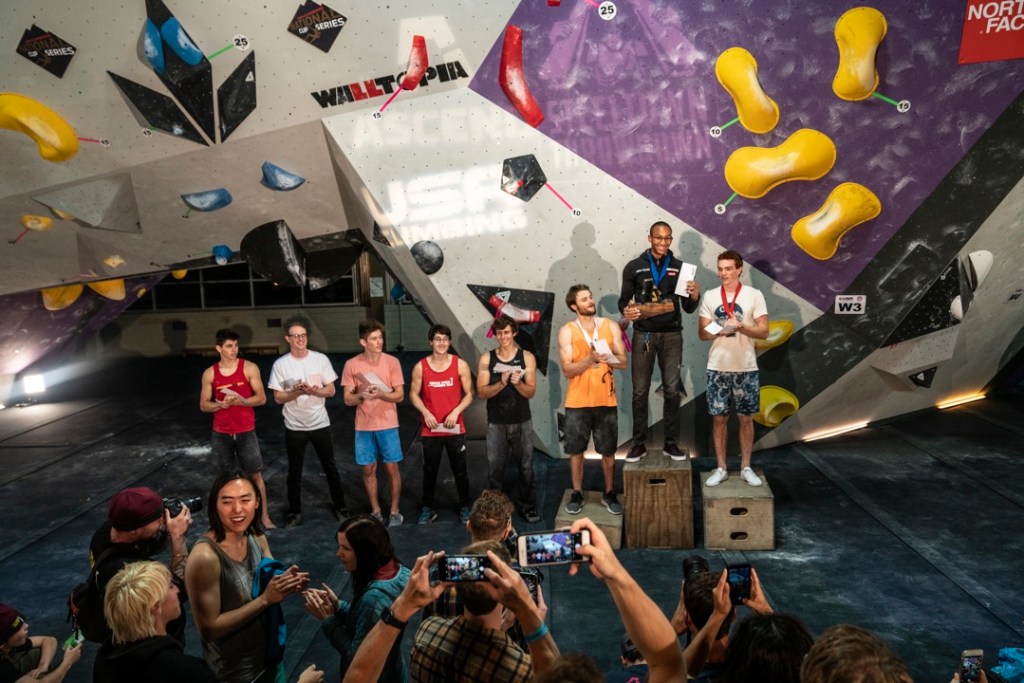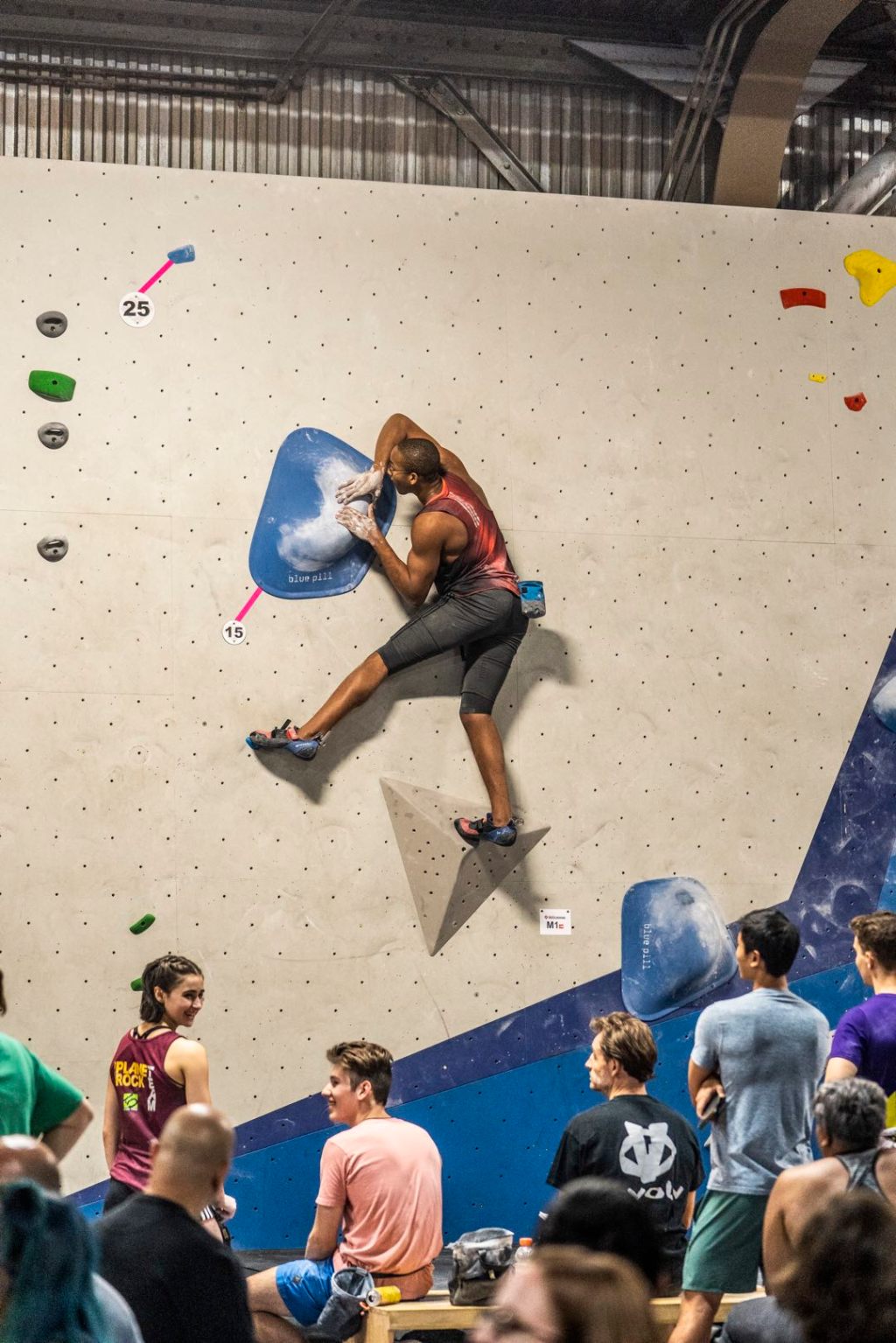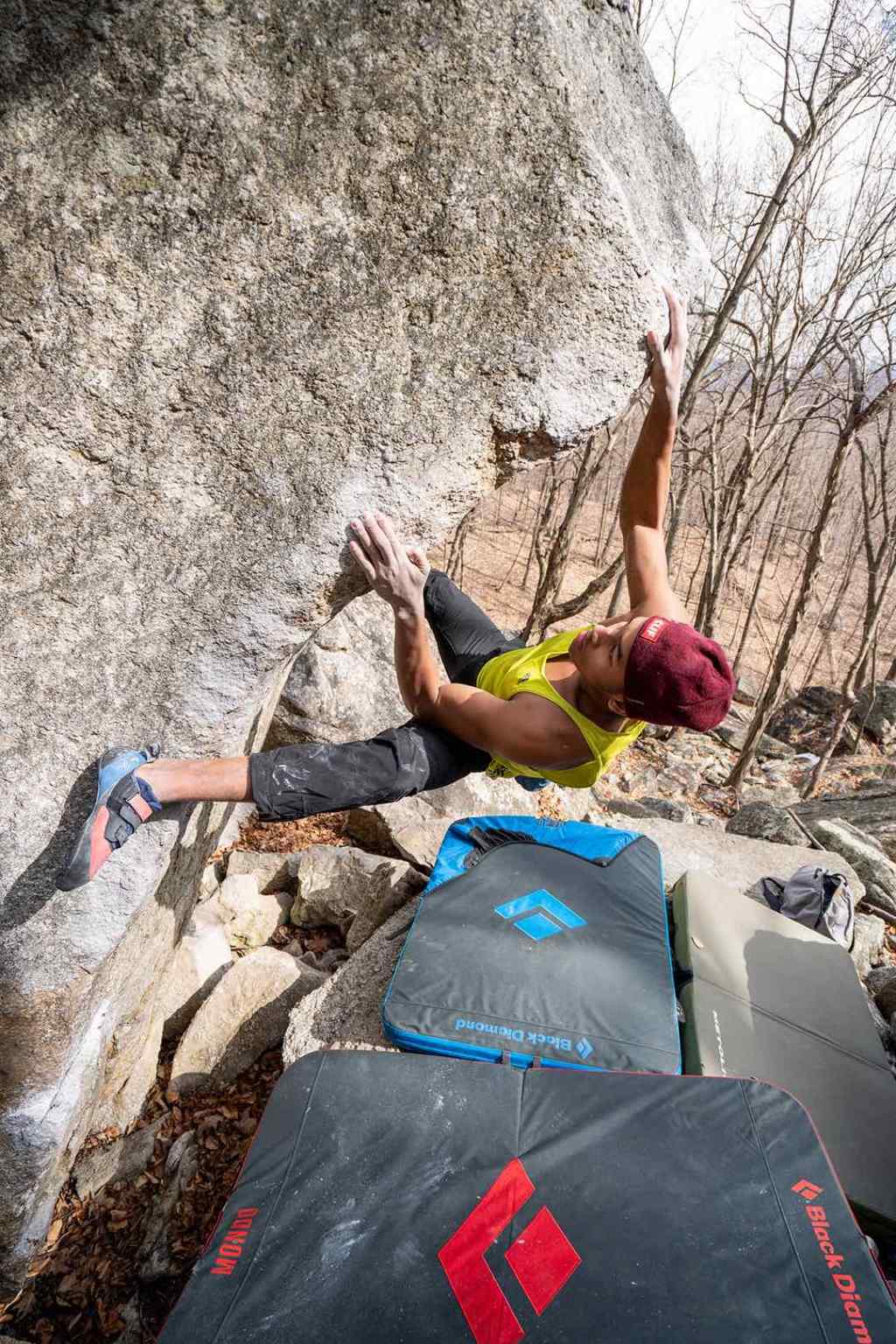When climber Kai Lightner started college as a 19-year-old freshman last August, he had two major goals. The first was demanding, but straightforward: keep up with the rigorous academics of his entrepreneurship major. On a full-ride scholarship at Babson College in Boston—ranked No. 1 for entrepreneurship 21 years in a row by U.S. News & World Report—he wouldn’t just be able to study for tests and take online classes. Lightner would be required to attend classes four days a week, study at least six days a week, and partake in post-school meetings, engaging daily with his professors and fellow students.
The second goal, qualifying for the 2020 summer games in Tokyo, was a bit more complicated. Lightner had been competing in climbing since he was 6, earning eight National Champion titles since 2010 and racking up countless international competition achievements. A self-described competitive person who is always looking for a new challenge, Lightner says contending for a spot in the games was an obvious next step. What wasn’t obvious, however, is how he and the other hopefuls would go about doing that.
In August 2016, it was announced that climbing would be a part of the 2020 summer games. The format of the competition itself was revealed at the same time: 40 climbers—20 women, 20 men—would compete over four days, and medals would be awarded based on combined performance in the three disciplines of bouldering, lead climbing and speed climbing. No country was guaranteed a spot, and each country could only have a maximum of four representatives total—two men, two women.
When Lightner started school in August 2018, the International Federation of Sport Climbing (IFSC), the governing body of all international climbing competition, had not yet revealed the official qualification requirements for the summer games. He had a good idea of which comps he needed to do well in, and which ones he could skip, so he planned his training and academic schedule accordingly.
Lightner trained five days a week, going to 6am strength and conditioning sessions for two hours with a personal trainer, then heading to the climbing gym at 6pm to meet up with his coach, Shane Messer, for two to three hours of climbing-specific training. On school days, he went to class and did homework in between training blocks, then headed to class meetings, did more homework, and then went to bed. On Wednesdays and Sundays, he rested from climbing by sleeping in and catching up with schoolwork.

Lightner stands on the podium at ASCEND Pittsburgh climbing gym in Pittsburgh, at a National Cup Series competition during the fall of 2018. Photo Credit: Daniel Gajda
In the beginning of the semester, the structured schedule already felt like second nature to Lightner, who had balanced academics and training throughout high school by dividing his days into half-hour periods. The diligence paid off when he graduated as valedictorian in June 2017 from Reed Ross Classical High School, with full-ride scholarship offers to multiple top-tier colleges.
After high school, he took a gap year to focus on competition climbing. “I was prepared for that time management,” he says, “but I wasn’t prepared for how different college is.” Living on his own, making his own schedule, adjusting to being in a new place—it was challenging, but Lightner was stubborn and determined to make it work.
There were nights when he would look at the clock and do the math: “OK, if I stop studying now and still try to make my 8am class, I can squeeze in four hours of sleep. I can work on that.” He felt that if he fell behind on anything, it would all fall apart. After a few months, fatigue started to build up, and it showed in his climbing. “One moment I’d win a national cup and the next comp I’d be 20th,” he says. “They were results I’d never seen before in my entire life, and it was really disheartening for me. My body was telling me, ‘You need to take a break.’ I just wanted to sleep.”
By December 2018, the qualifiers for the summer games were all but set in stone, however the new format switched up which competitions Lightner would have to focus on—comps he’d previously thought he could skip based on performance in past events. Lightner would have to spend the next year competing in all of the World Cup competitions, the World Championship, the Americas Continental Championship, national qualifying events and summer games-specific qualifying events. He was going to have to change everything about his daily life—at a time when his motivation was starting to wane. He already felt like he was working for that next break instead of living in and enjoying the moment.
When the fall semester ended, Lightner took time to reflect on everything and discuss things with his mother, Connie, who has always been his closest confidant. “I would bring it up and the whole mood would just change,” Connie says. “He would become very solemn, like it was killing him to choose between the two things he enjoyed. Had he known all the factors in advance, he could have made an informed decision, but it was all still coming together. The timing was bad. [I told him] unfortunately in life you deal with the hand you’re dealt and make the best decision you can.”

Lightner makes moves at ASCEND Pittsburgh climbing gym in Pittsburgh, at a National Cup Series competition during the fall of 2018. Photo credit: Daniel Gajda
“I realized that the schedule wasn’t manageable for me, and that something had to change in order for me to accomplish what I wanted and be able to keep the level [of performance] I was accustomed to, because I refused to let either of the activities slack off,” he says. “Mediocrity is not an option for me.”
On February 8, Lightner made the announcement on Instagram, writing: “I’ve decided to move in a new direction and take a hiatus from competition climbing. … I’m excited to pursue different passions in the climbing world while focusing on my academics. I LOVE climbing and I’m excited to explore a different side of it!”
Connie says that while it was a huge weight lifted, the first two weeks were really hard. “I could hear it in his voice when I talked to him,” she says. “After the first two weeks, I realized he was going to parties, and he went to New York City on a whim just for the weekend. That’s something he never did in his entire life—he was always so focused on training. Now it’s time to have a little fun and enjoy it. He’s only 19. I want him to have fun teenage years before those are over.”
Lightner still keeps up a skeleton schedule, climbing five days a week, because that’s what he’s used to. “I go climbing to destress, calm down and express myself,” he says. But for the foreseeable future, Lightner will focus on outdoor climbing at areas near his school, like Rumney, New Hampshire, and the Shawangunks, in New York. He also wants to get back to some of his old climbing projects in France and Spain that he abandoned for indoor training. Now he can be like other climbers, flipping through the guidebook to find climbs that look fun instead of feeling pressure to climb at a certain level.
But Lightner’s climbing plans still extend beyond his personal objectives. He has long been active in his local and national communities, speaking at events, volunteering at Boys and Girls Clubs and fundraising for the adaptive climbing community, but now he’s employing his experience as an entrepreneurship major to effect change on a larger scale. Using what he’s learned in his business and marketing classes, Lightner is in the midst of designing a few project proposals, something he’s wanted to do for a while but never had the time, he says.

Photo credit: Chris Vultaggio
He also wants to give other minorities and people in high-poverty areas the ability to find pursuits beyond stereotypical ball sports. He was introduced to climbing by chance at 6 years old when a stranger saw him climbing a flagpole and suggested the local climbing gym to his mother. But growing up in Fayetteville, North Carolina, an area where outdoor recreation wasn’t a thing, he says, Lightner was teased and made fun of for climbing as a minority. “[I was told], ‘Rock climbing is not a sport for us. It’s a sport for smiling white people in commercials,’” he remembers. “But it worked out for me.”
Now he wants to focus on diversity and inclusion initiatives with the adaptive climbing community and Memphis Rox, a nonprofit gym that uses climbing and other programs like dance, cooking and music as a means to heal communities and “foster relationships across cultural, racial, ethnic and socioeconomic backgrounds,” according to their website.
“Comp climbing has given me the ability to have a platform to support my community, to have resources to help others who aren’t as fortunate,” he says. “We should be given opportunities to look elsewhere to find our passions, and the option to pursue them. [Memphis Rox] is using climbing as a way to build that community aspect to get more kids exposed to new opportunities, to keep people busy and out of trouble. I just want to do my part to further that project.”
And as far as Lightner’s dreams of competing in the summer games are concerned?
“There’s always 2024,” he says.
